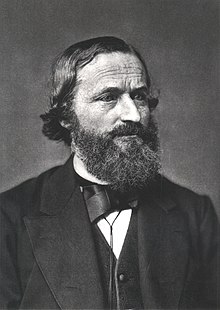Gustav Robert Kirchhoff (German: [ˈkɪʁçhɔf]; 12 March 1824 – 17 October 1887) was a German physicist who contributed to the fundamental understanding of electrical circuits, spectroscopy, and the emission of black-body radiation by heated objects.[1][2]
He coined the term black-body radiation in 1862. Several different sets of concepts are named "Kirchhoff's laws" after him, concerning such diverse subjects as black-body radiation and spectroscopy, electrical circuits, and thermochemistry. The Bunsen–Kirchhoff Award for spectroscopy is named after him and his colleague, Robert Bunsen.
Gustav Kirchhoff | |
|---|---|
 | |
| Born | Gustav Robert Kirchhoff 12 March 1824 |
| Died | 17 October 1887 (aged 63) |
| Nationality | Prussian (1824–1871) German (1871–1887) |
| Alma mater | University of Königsberg |
| Known for | Kirchhoff's circuit laws Kirchhoff's law of thermal radiation Kirchhoff's laws of spectroscopy Kirchhoff's law of thermochemistry |
| Awards | Rumford medal (1862) Davy Medal (1877) Matteucci Medal (1877) Janssen Medal (1887) |
| Scientific career | |
| Fields | Physics Chemistry |
| Institutions | University of Berlin University of Breslau University of Heidelberg |
| Doctoral advisor | Franz Ernst Neumann[citation needed] |
| Notable students | Loránd Eötvös Edward Nichols Gabriel Lippmann[citation needed] Dmitri Ivanovich Mendeleev Max Planck Jules Piccard Max Noether Heike Kamerlingh Onnes Ernst Schröder |
https://en.wikipedia.org/wiki/Gustav_Kirchhoff
Baron Loránd Eötvös de Vásárosnamény (or Loránd Eötvös, pronounced [ˈloraːnd ˈøtvøʃ], Hungarian: vásárosnaményi báró Eötvös Loránd Ágoston; 27 July 1848 – 8 April 1919), also called Baron Roland von Eötvös in English literature,[2] was a Hungarian physicist. He is remembered today largely for his work on gravitation and surface tension, and the invention of the torsion pendulum.
In addition to Eötvös Loránd University[3] and the Eötvös Loránd Institute of Geophysics in Hungary, the Eötvös crater on the Moon,[4] the asteroid 12301 Eötvösand the mineral lorándite also bear his name.
https://en.wikipedia.org/wiki/Loránd_Eötvös
No comments:
Post a Comment